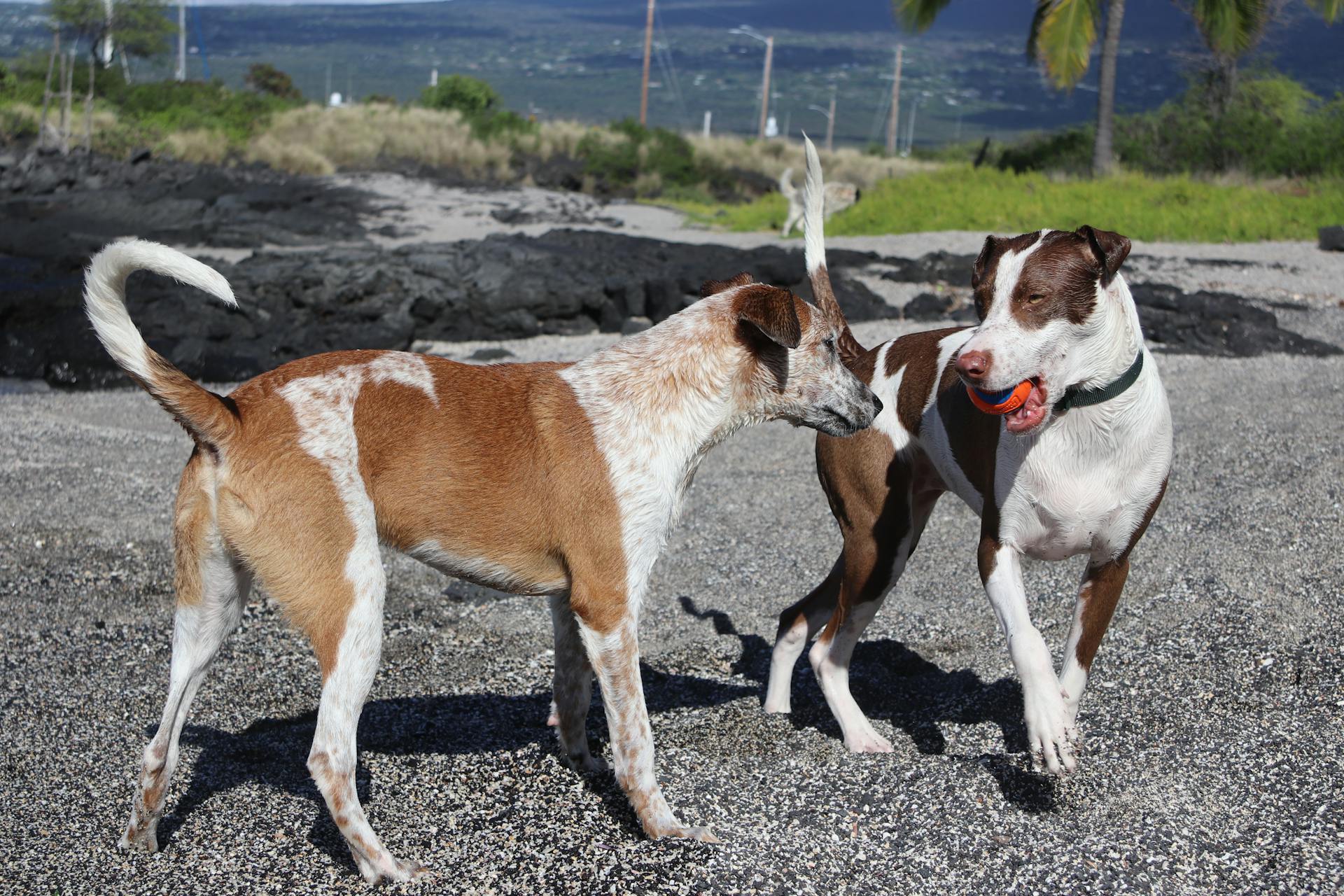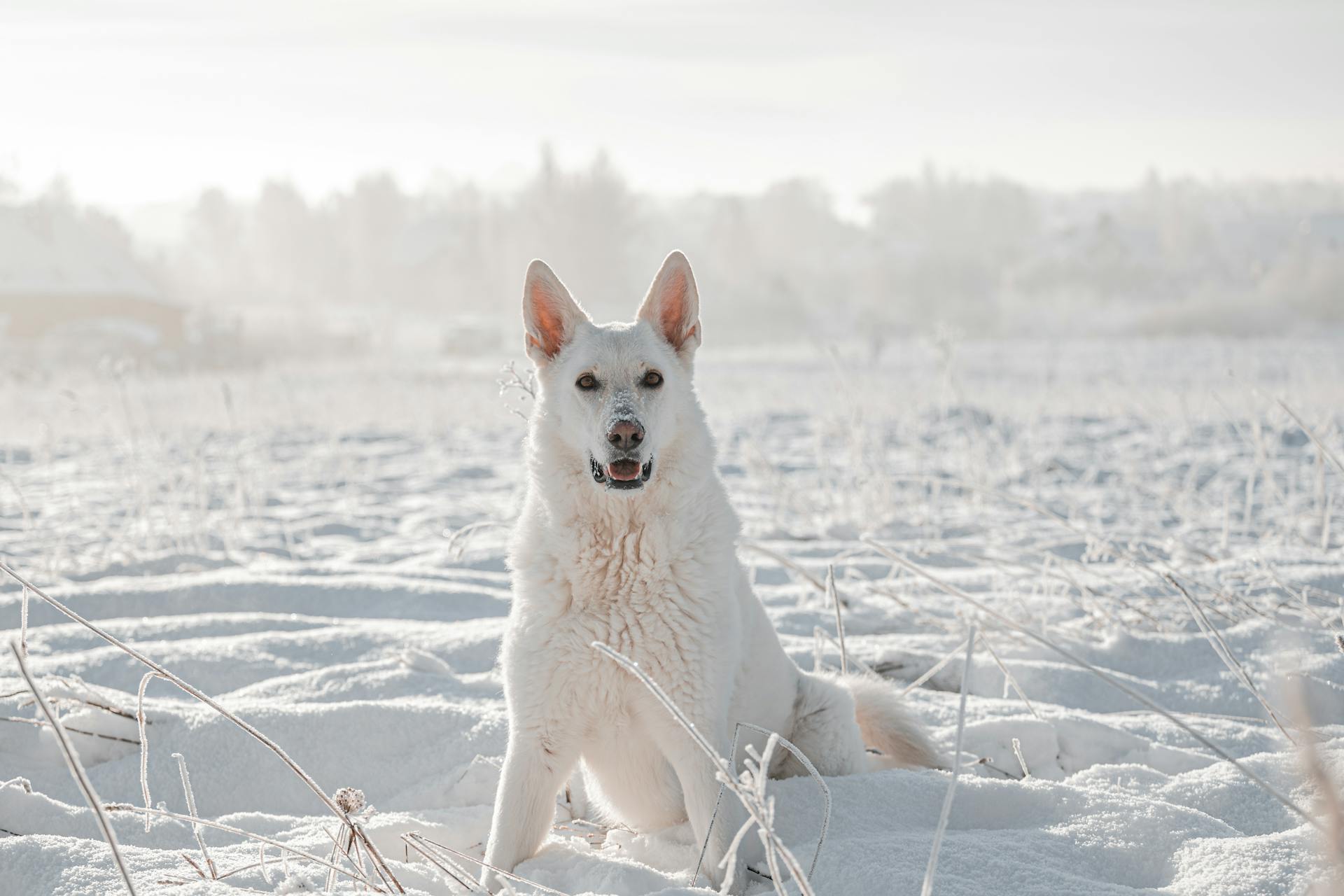
Dogs eating cough drops is a common problem that can be prevented with some simple measures.
Keep cough drops out of reach of your furry friends to avoid the temptation altogether.
Cough drops can be toxic to dogs, and even small amounts can cause harm.
If you suspect your dog has ingested cough drops, act quickly and call your veterinarian or a pet poison hotline.
Risks and Dangers
Dogs eating cough drops can be a serious matter, and it's essential to understand the risks involved. Xylitol, a common sugar substitute in cough drops, is particularly hazardous for dogs.
Xylitol can cause severe consequences for our canine companions, including hypoglycemia, liver failure, and even seizures. If your dog eats cough drops containing Xylitol, time is of the essence to prevent severe health problems.
Even small amounts of Xylitol can be toxic to dogs, and the severity of the reaction depends on several factors, including the size of your dog, the number of cough drops consumed, and the presence of other ingredients.
Small dogs and puppies are more sensitive to toxic chemicals than larger dogs, making them more susceptible to cough drop toxicity. If your dog has consumed multiple Xylitol-containing cough drops, monitor them closely and consider a call to your vet.
If your dog eats cough drop wrappers, they can potentially cause a digestive blockage, which can be life-threatening if not treated promptly. A blockage requires veterinarian assistance to treat.
Here are some signs of a digestive blockage to watch out for:
- Bloating
- Irritability
- Pain and discomfort
- Straining to use the bathroom
If you suspect your dog has eaten cough drops or is experiencing any of these symptoms, it's crucial to contact your vet immediately. A vet's intervention is needed to free the blockage and prevent further complications.
Prevention and Action
Immediate action is necessary if you suspect your dog has ingested a cough drop containing xylitol.
Contacting your veterinarian and taking specific steps at home can be critical in mitigating the potential harm caused by xylitol ingestion.
Preventing your dog from accessing cough drops is fundamental to their well-being.
Proactive measures can significantly reduce the risk of accidental ingestion and potential harm.
In case your dog eats cough drops, remaining calm is key.
Try to find the cough drop box and check the ingredients to determine the severity of the situation.
It's best to promptly contact your vet or the pet poison helpline to get advice on your next actions.
In case you notice any signs of cough drop toxicity, take your furry friend to the vet right away.
Related reading: Drop off Dog Training
Cough Medications and Alternatives
Dogs can get a sore throat and cold just like humans, but it's essential to avoid giving them cough drops as they contain toxic ingredients.
Cough drops contain sugar, menthol, eucalyptus oil, and other flavorings and colors that can upset a dog's stomach.
Xylitol, a sugar-free sweetener found in many cough drops, is particularly hazardous for dogs, causing hypoglycemia, low blood sugar, and liver damage.
See what others are reading: Dogs Eating Sugar
Benzocaine, another common ingredient, can lead to methemoglobinemia, a rare but life-threatening condition.
If your dog eats a cough drop, it's crucial to monitor them closely for symptoms like depression, weakness, fast breathing, discolored saliva, jaundice, vomiting, hypothermia, and swelling of the face or jaw.
Here are some safe alternatives to cough drops for your dog:
- Honey or peanut butter to soothe a sore throat
- Chicken or beef broth to ease congestion
- A humidifier to add moisture to the air
- A warm compress to help loosen mucus
Remember, it's always better to err on the side of caution and consult with your veterinarian if you're unsure about what to give your dog.
Emergency Measures
Time becomes a critical factor when your dog has ingested a cough drop, especially one containing xylitol. Immediate and decisive action is paramount to minimize potential harm.
You should retrieve the packaging of the cough drop if available, as it will assist the veterinarian in identifying the ingredients and determining the appropriate course of action.
Contact your veterinarian immediately and provide them with details such as the dog's breed, size, and the amount and type of cough drop ingested. Follow their guidance closely.
Monitoring your dog for any signs of distress is crucial, as symptoms of xylitol poisoning, such as vomiting, loss of coordination, and lethargy, may manifest rapidly.
Do not induce vomiting, as it can exacerbate the release of insulin, leading to more severe complications.
Keeping your dog calm is essential to prevent additional complications related to separation anxiety or excitement.
Here's a summary of the emergency measures:
Understanding Dog Behavior
Dogs eating cough drops can be a puzzling behavior, but understanding dog behavior can help us make sense of it. Dogs are naturally curious creatures and will often investigate new objects with their mouths.
Their sense of smell is incredibly powerful, and they may be attracted to the strong scent of cough drops. In fact, dogs have up to 300 million olfactory receptors in their noses, compared to only 6 million in humans.
Some dogs may also be motivated by the sweet or sour taste of cough drops, which can be appealing to their taste buds.
Why Do They Eat?

Dogs are drawn to cough drops because of their scent. They'll try to taste them if they see or smell them.
Some dogs are more curious than others, but most will investigate cough drops if they get the chance.
You should never keep cough drops around your pet, as they can be a tempting treat.
Is Coughing Bad for Dogs?
Coughing can be a normal response to an irritant in a dog's airway, but in some cases, it can be a sign of an underlying issue. Cough drops, for example, can be toxic to dogs due to ingredients like sugar, menthol, and eucalyptus oil.
Dogs can get a sore throat and cold just like humans, and it's tempting to give them cough drops to soothe their discomfort. However, most cough drops contain ingredients that are harmful to dogs.
Manufacturers are increasingly using xylitol in cough drops, which is a sugar-free sweetener that is toxic to dogs. Xylitol can cause hypoglycemia, low blood sugar, and liver damage in dogs.
For your interest: Toxic Food for Dogs Pdf
Cough drop poisoning can have severe symptoms, including depression, weakness, fast breathing, discolored saliva, jaundice, vomiting, hypothermia, and swelling of the face or jaw.
If you suspect your dog has eaten a cough drop, it's essential to act quickly. Check the ingredients list of the cough drop to determine if it contains harmful substances, and try to figure out when and how much your dog ate. Bring a sample of the cough drop to the vet if possible.
Toxic Substances and Allergies
Cough drops can contain toxic substances like xylitol, which can be especially hazardous for dogs.
Even one cough drop can potentially be harmful to your dog, depending on the individual circumstances.
It's essential to keep cough drops in a safe and hard-to-reach area, such as a medicine cabinet, to prevent your dog from eating them.
Dogs may not show signs of cough drop toxicity immediately, sometimes taking a couple of days to appear.
Contacting your vet or pet poison helpline promptly is crucial if you suspect your dog has ingested a cough drop.
If you notice any signs of cough drop toxicity, take your dog to the vet right away to prevent severe health problems.
Here's an interesting read: Salt Water Toxicity in Dogs
Frequently Asked Questions
Are Ricola cough drops poisonous to dogs?
No, Ricola cough drops are not poisonous to dogs. However, if your pet ingests them, contact your veterinarian for advice.
Featured Images: pexels.com


